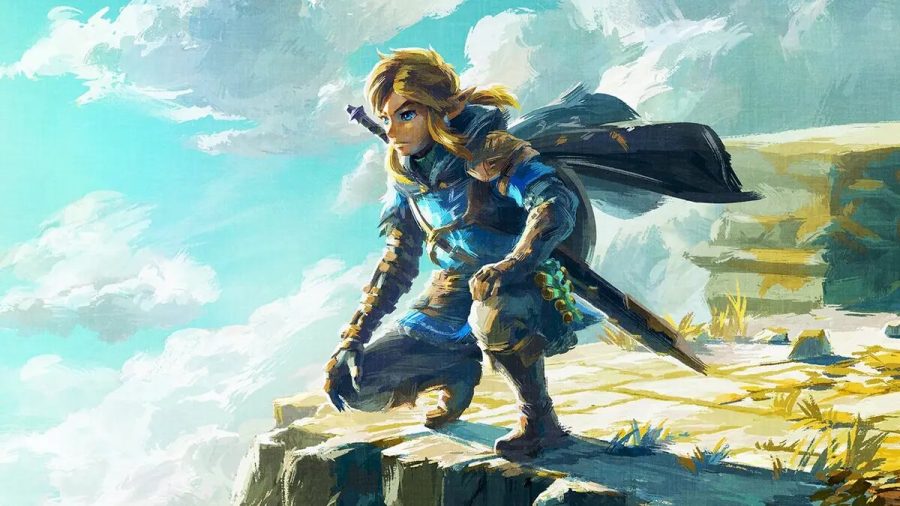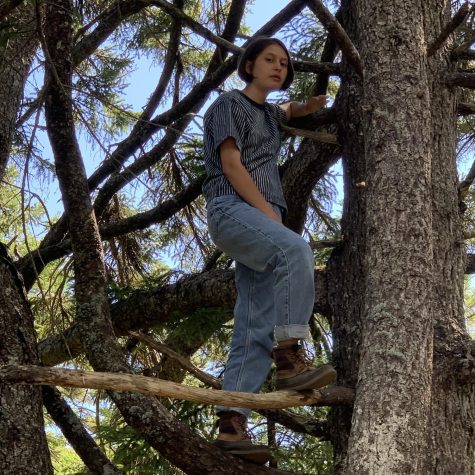Taking Breath of the Wild to New Heights
June 6, 2023
It’s difficult to overstate the cultural importance of Breath of the Wild (BotW). Released in 2017, it dominated the world of gaming, receiving near universal praise from gaming publications and ultimately being crowned 2017’s game of the year. Years later, this sharp redefinition of one of Nintendo’s most classic series, The Legend of Zelda (TLoZ), has come to define an era of its own. Although BotW keeps the same ultimate goal as its predecessors—saving Princess Zelda—it eschews the linear narrative of past TLoZ games in favor of an open-world game geared towards exploration. Six years later, it’s hard to find a game that doesn’t cite BotW as some sort of inspiration. Now, after years of development, numerous delays, and four years since its reveal, BotW’s sequel, Tears of the Kingdom (TotK), stands at the precipice of greatness. It can cement its place in the canon of great games, or it can stumble and fall. Thankfully, this newest installment in The Legend of Zelda series, mirroring its protagonist, Link, leaps off this precipice and learns to soar on the way down.
The most notable change between TotK and BotW lies in its scope. Although both are built in the same engine, TotK is reportedly twice the size of BotW—it delights in this expanded sense of scale. TotK allows its player to explore islands floating miles above the kingdom of Hyrule, as well as cave systems and wells that constitute the kingdom’s depths. Link can now launch himself off floating islands miles in the sky, the player marveling at the beautifully rendered landscapes he hurtles towards. This expanded terrain is a feat of game development in itself, and the introduction of new areas of exploration invites infinitely new ways to interact with this wider world.
Replacing the rune mechanic of the older game is Link’s new arm, infused with various powers that are both more intuitive and experimental than their predecessors. Through Link, the player can now ascend vertically, reverse an object’s path through time, and fuse objects together to create anything from enhanced weapons to fully functioning tanks. TotK seems designed with player ingenuity in mind: the building mechanic appears limitless within the engine itself. The only stumbling block is the player’s own creativity. Link’s expanded abilities allow for hours of more playtime and aimless but fulfilling exploration, two of the things that made BotW as great as it is. While these new powers may take some time to get used to, and while the tutorial level may infuriate at times, the end result of a reactive world as variable as it is large more than justifies the learning curve.
Moving behind the mechanics, the narrative itself is far from perfect—TotK unfortunately falls victim to the same issues with orientalism and misogyny as almost every other game in the series. The storyline follows a classic “save the princess” narrative, and Princess Zelda is not afforded much agency within the story. She disappears for most of it, a role too similar to the one she had been relegated to in BotW and every Zelda game prior. Likewise, TotK treads the same uncomfortable ground as its predecessors in its depictions of Ganondorf, the main antagonist and incarnation of malice. Ganondorf belongs to the Gerudo, a group of mostly-female warriors living in the desert, an obvious parallel to an amalgam of real-world Southwest Asian cultures. Their depiction in BotW and throughout The Legend of Zelda series has garnered criticism, as has the role of Ganondorf. However, despite these flaws, the game retains its levity.
TotK’s plot builds and expands upon the lore established in BotW—a key component of both the plot and Link’s newfound abilities lies with the Zonai, an ancient civilization only hinted at during BotW. But the game pays equal homage to its predecessor. Taking place only a few years after the events of the first game, TotK is full of familiar faces and places that will delight returning players and infatuate new ones. The game even syncs with the save data from BotW linked to the same Nintendo Switch account, creating a direct and personalized cohesion from one game to the next. While having knowledge of and experience with the first game is a benefit, BotW is in no way a prerequisite for TotK. Newcomers to the series will find as much joy in the imaginative puzzles and emotionally charged plot as Legend of Zelda veterans.
Overall, Tears of the Kingdom pulls its weight, proving itself a worthy addition to one of Nintendo’s most famous franchises. While nothing may ever surpass the immense impact of Breath of the Wild, both culturally and within the games industry itself, TotK certainly comes close, delivering a story with a scope just as wide and revolutionary as its prequel. With a seventy-dollar price tag, this game certainly doesn’t come cheap. But it’s still worth every penny of that price.







